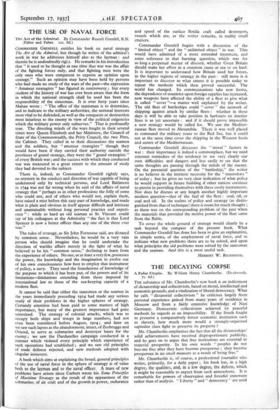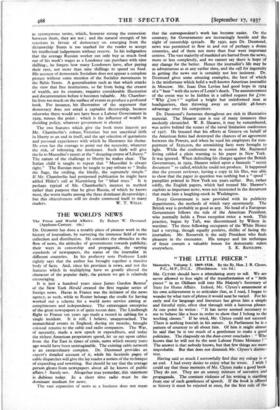THE DECAYING CORPSE
THE substance of Mr. Chamberlin's new book is an indictment of dictatorship and collectivism, based on moral, intellectual and economic grounds, and a vindication of liberal democracy. What he calls " dictatorial collectivism " he criticises largely from personal experience gained from many years of residence in Moscow and from a fairly extensive knowledge of Nazi Germany. Democratic collectivism achieved by peaceful methods he regards as an impossibility. If the South fought to preserve a comparatively minor economic institution such as slavery, how much more would a strongly-organised capitalist class fight to preserve its property ?
Mr. Chamberlin emphasises the fact that all the dictatorships' solid achievements have received disproportionate publicity, and he goes on to argue that free institutions are essential to material prosperity. In his own words " peoples do not beccme free after they have become prosperous ; they become prosperous in no small measure as a result of being free."
Mr. Chamberlin is, of course, a professional journalist who writes, primarily, for a daily paper ; his book has, in a high degree, the qualities, and, in a low degree, the defects, which it might be reasonable to expect from such antecedents. It is remarkable for powers of observation and forceful statement rather than of analysis. " Liberty" and " democracy " are used as synonymous terms, which, however strong the connexion between them, they are not ; and the natural strength of his reactions in favour of democracy on emerging from the dictatorship States is too marked for the reader to accept his intellectual judgements without reserve. In his indignation that the average Russian worker can only buy as much food out of his week's wages as a Londoner can purchase with nine shilling;, he forgets how many Londoners have, after paying their rent, not more than nine shillings to spend on food. His account of democratic Socialism does not appear a complete picture without some mention of the Socialist movements in the Baltic States. A generalisation such as that which attacks the view that free institutions, so far from being the creator of wealth, are its creature, requires considerable illustration and documentation before it becomes valuable. Mr. Chamber- lin lives too much on the surface of events to produce a profound book. For instance, his illustration of the argument that democracy does not entail a capitalist dictatorship, because otherwise there would not have been a Labour Government in 1929, misses the point : which is the influence of wealth in deciding policy, whatever government is elected.
The two features which give the book most interest are Mr. Chamberlin's robust, Victorian but not uncritical faith in liberty as an end in itself, and the apt selection of quotations and personal experiences with which he illustrates his theme. He even has the courage to point out the necessity, whatever the risk, of tolerating the intolerant. Such faith will give the lie to Mussolini's taunts at the " decaying corpse of Liberty." The nature of the challenge to liberty he makes clear. The Italian child is taught to repeat that " Mussolini is always right." The Russian must be taught to pay tribute to " Stalin the Sage, the smiling, the kindly, the supremely simple." If Mr. Chamberlin had postponed publication he might have added Hitler's call at Nuremberg for " blind trust." It is perhaps typical of Mr. Chamberlin's interest in method rather than purpose that he gives Russia, of which he knows most, the worst marks among the three dominant dictatorships ; but this objectiveness will no doubt commend itself to many











































 Previous page
Previous page